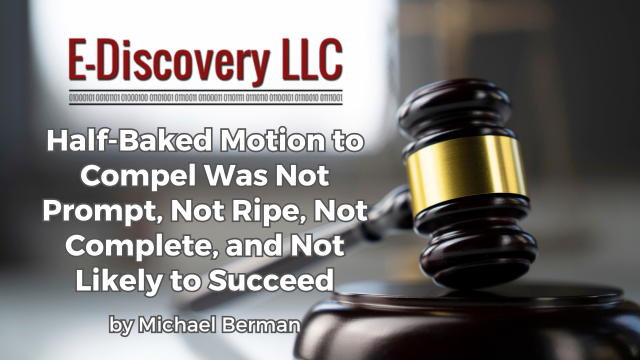
[EDRM Editor’s Note: The opinions and positions are those of Michael Berman.]
Golat v. Wisconsin State Court System, 2025 WL 2390556 (W.D. Wisc. Aug. 18, 2025), involved a motion to compel that was not prompt, not ripe, and not complete. The court wrote:
Parties must allow a reasonable amount of time for the other side to address alleged discovery deficiencies. Waiting until the last week of discovery to challenge a privilege log disclosed months before, demanding immediate attention, and then rushing to court for an order is a recipe for a half-baked motion to compel unlikely to succeed. That appears to be what happened here. Had plaintiff’s counsel allowed the meet-and-confer process to play out, this motion likely would have been avoided given that defendants have since produced a supplemental log and production. [Emphasis added].
Golat v. Wisconsin State Court System, 2025 WL 2390556 (W.D. Wisc. Aug. 18, 2025).
PLAINTIFF’S MOTION WAS NOT COMPLETE
Plaintiff moved to compel, asserting that: (1) defendant’s privilege log was deficient; (2) documents were wrongfully withheld; and, (3) defendants refused to confer about the issues.
Defendants “responded to the motion with correspondence showing they had attended to plaintiff’s complaints promptly and were in the process of addressing them when the motion was filed.”
Plaintiff replied that many disputes had been resolved, “but still asks that the court conduct an in camera review of 17 documents.”
First, the court addressed accuracy and completeness of plaintiff’s filing. Plaintiff asserted that defendants refused to confer about the alleged deficiencies in their privilege log. The court wrote:
Part of working in good faith means giving the opposing side a reasonable time to consider and address complaints. How much time depends on the context of the case and the complaints.
The record shows that plaintiff did not satisfy these requirements. Rather, the parties’ correspondence indicates that plaintiff raised broad concerns with defendants’ privilege log, agreed to a plan, changed positions, and then filed the instant motion—all within a week.
Id.
The court wrote:
The parties’ correspondence shows that defendants’ counsel acknowledged and made reasonable, timely attempts to respond to plaintiff’s concerns about the privilege log. Defendants’ counsel stated that she and her staff had limited availability but would nevertheless endeavor to respond the following week. Even though plaintiff’s counsel appeared to accept that timeline, and acknowledged the explanation regarding duplicative documents, plaintiff filed her motion to compel within days. Although defendants’ counsel did not immediately respond to plaintiff’s counsel’s July 28 follow-up request regarding availability, that is reasonable in light of the fact that the parties appeared to have agreed on an approach to resolving the dispute and the proposed timeframe to remedy the concerns had not yet elapsed.
Id.
The court held that plaintiff had failed to comply with the Rule 37(a)(1) requirement of a good faith conference.
It added that “the materials that plaintiff’s counsel provided in support of the motion to compel were not complete. The email chain that plaintiff’s counsel provided jumps from defendants’ counsel’s Friday afternoon email to plaintiff’s counsel’s Monday morning email. It omits plaintiff’s counsel’s intervening email sent later on Friday afternoon…. This is an important email because it shows the parties were communicating about the privilege log and had reached an understanding on approach and timeframe. It is difficult to understand why it was not included in the materials supporting plaintiff’s motion when the email immediately before and the email immediately after were.” [Emphasis added].
This is an important email because it shows the parties were communicating about the privilege log and had reached an understanding on approach and timeframe. It is difficult to understand why it was not included in the materials supporting plaintiff’s motion when the email immediately before and the email immediately after were.
Golat v. Wisconsin State Court System, 2025 WL 2390556 (W.D. Wisc. Aug. 18, 2025).
The court wrote that there is a duty of candor to the court “which requires a complete and accurate recounting of the facts relevant to the issue at hand.” The court ordered: “Plaintiff must show cause in writing by September 2, 2025, to explain the failure to provide complete and accurate materials relevant to the motion to compel and why this failure should not result in sanctions.”
THE MOTION WAS NOT PROMPT AND NOT RIPE
The Golat court wrote that:
Plaintiff’s motion is also subject to denial because it is neither prompt nor ripe. Although these are typically contradictory concepts, they are not in this case. [Emphasis added].
Id.
First, “[t]he motion is not prompt because it was filed about nine months after the privilege log at-issue was served.” And, it was filed two days before the close of discovery.
While this tight timing may be unavoidable in some cases, there is no indication it was unavoidable here. The court warned the parties at the beginning of the case that this court “expects the parties to file discovery motions promptly if self-help fails.” … Plaintiff did not meet this expectation.
Id.
Second, “[t]he motion is not ripe because defendants’ counsel is actively working on resolving the issues raised. On August 6, 2025, defendants’ counsel sent plaintiff 188 documents that had incorrectly been marked as privileged, and intends to produce more.” Further, defendants had resolved many of the issues, and the court wrote: “This point relates both to the lack of a good-faith effort to meet and confer and to the late timing of the motion.”
The court denied plaintiff’s motion to compel and also denied plaintiff’s request for in camera review.
Assisted by GAI and LLM Technologies per EDRM GAI and LLM Policy.


